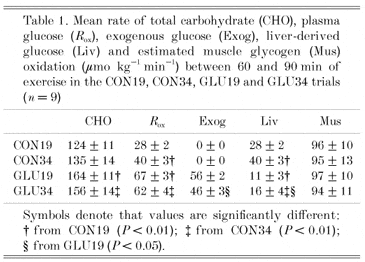While the effects of environmental heat stress on substrate metabolism during submaximal cycle exercise are well documented (Febbraio et al. 1994), little is known about the combined effects of heat stress and glucose ingestion on substrate metabolism and exercise tolerance during prolonged running. The purpose of the present study was to test the hypothesis that exercise in the heat increases the metabolism of skeletal muscle glycogen and that this response is attenuated by glucose ingestion.
Following ethical approval, nine trained male subjects ran at 60 % VO2,max for 120 min or until volitional exhaustion, on four separate occasions, in a temperate (19°C) and a hot environment (34°C), whilst ingesting either a 12.5 % glucose solution (GLU) or water (CON). On each occasion [U-13C]-glucose and [6, 6-2H2]-glucose tracers were used to quantify the rate of appearance (Ra), disappearance (Rd) and oxidation (Rox) of plasma glucose. Rectal temperature (Tre) was measured and venous blood samples were drawn every 15 min during exercise. Statistical comparisons were made using analysis of variance (ANOVA) techniques. Data are presented as means ± S.E.M.
In the CON trials, heat stress did not influence total CHO or muscle glycogen oxidation, but markedly increased the Ra, Rd and Rox of plasma glucose. In the GLU trials, total CHO and plasma glucose oxidation were increased, ‘sparing’ liver glycogen, but to less of an extent in the GLU34 compared with the GLU19 trial, possibly because exogenous glucose oxidation was reduced in the heat. Fatigue occurred earlier at the same Tre (39.4 ± 0.1 °C) when exercise was performed in the heat, but later (P < 0.05) in the CON34 (112 ± 4 min) compared with the GLU34 (100 ± 5 min) trial. These results demonstrate that heat stress increases hepatic glucose production and oxidation, a process that can be mediated by an augmented sympatho-adrenal response (Howlett et al. 1999). It is concluded that glucose ingestion exerts its ergogenic effect by maintaining a high rate of CHO oxidation and ‘sparing’ liver glycogen, but to less of an extent during exercise in the heat, probably due to a reduction in splanchnic blood flow (Rowell et al. 1968) and intestinal absorption. Consequently, thermal strain is increased and exercise tolerance decreased when a 12.5 % glucose solution is ingested during prolonged running in the heat.
This work was sponsored by the Ministry of Defence (Navy).

